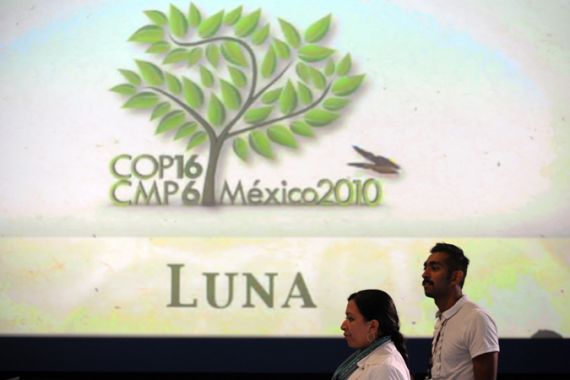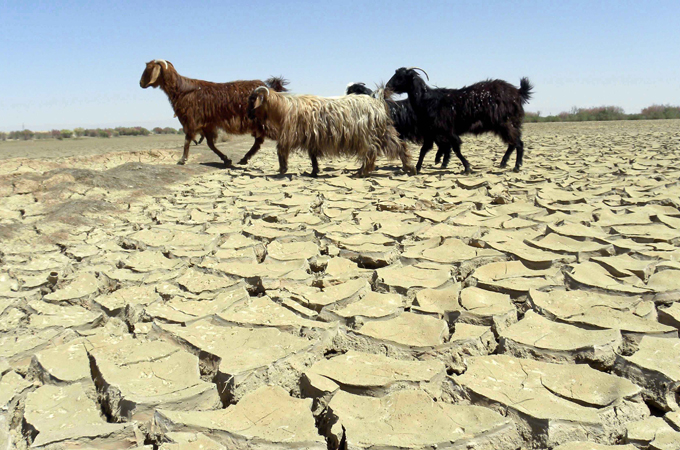Q&A: Cancun summit delegate
Dr Rosalind Reeve, an environmental lawyer, on what should be the outcome of the Climate Summit in Mexico.

 |
| Despite dangerous environmental changes linked to global warming, international delegates are having a hard time making a plan during climate change negotiations in Cancun, Mexico [EPA] |
As the latest round of climate talks in Cancun, Mexico, enter the crucial final week, there does not seem to be a lot of progress.
Negotiators at the 194-country United Nations talks are not expected to agree to a definitive replacement of the Kyoto Protocol but are hoping to building on the modest package of measures that a majority of nations backed at last year’s acrimonious Copenhagen climate conference.
Keep reading
list of 4 itemsAfter the Hurricane
World’s coral reefs face global bleaching crisis
Why is Germany maintaining economic ties with China?
Fernando Tudela, Mexico’s deputy environmental ministerm said on Monday that he is “hopeful” that countries will agree to limit carbon emissions. Despite that, there is still no sight of an agreement on legally binding targets.
Ministers in Cancun are also discussing setting up a so-called “green” fund that could help developing nations slash greenhouse gases. But the realisation such a fund looks highly unlikely.
Dr. Rosalind Reeve is the forest campaign manager for Global Witness and an associate fellow of Chatham House, a leading independent think tank on international affairs. Speaking to Al Jazeera from the conference in Cancun, she (in her own capacity) sketches the ideal final statement for the summit.
What is at stake in Cancun?
A successful outcome in Cancun is vital to build confidence in global multilateral processes as well as to make concerted progress towards averting dangerous climate change. If they fail, there will be ramifications beyond these talks that could impact the future of international law.
Why does Cancun have a lower profile than Copenhagen?
Copenhagen was a disaster in more ways than one. Expectations were high and failure inevitable. Since then there have been efforts by governments and the UN to play down the potential outcome of Cancun.
What are the major stumbling blocks?
|
“If they fail, there will be ramifications beyond these talks that could impact the future of international law.” Dr. Rosalind Reeve at the Cancun Climate Summit |
One major stumbling block is the need for all countries to reach consensus on decisions in the climate change convention. This means that just one country can block progress. Currently, economic and development priorities and sovereignty concerns take precedence over the imperative to tackle climate change. Our priorities have to change if we are to make real progress.
What are the expectations?
Overall the expectations for Cancun are low. Some building blocks are expected to be agreed, including an agreement on REDD (reducing emissions from deforestation and forest degradation in developing countries), and on finance. But any final agreement must be part of a balanced package that will ensure binding and ambitious commitments to reduce greenhouse gas emissions.
Who are the winners and losers in Cancun?
It is premature to predict winners and losers as there is still another week to go.
A recent survey by GlobeScan points to a declining interest in the issue of climate change in the West. What is your reaction to this trend?
There is a danger that the declining interest in climate change will diminish political will and delay concerted action to tackle the biggest issue of our time.
What would be the final text for the Summit if you wrote it yourself?
The objective is a fair, ambitious and binding agreement with the aim of keeping global temperature rise well below 1.5 degrees C above pre-industrial levels.
To reach that goal we need legally binding commitments for all high emitting countries with the aim of returning greenhouse gas concentrations in the atmosphere to 350ppm, and recognising different capabilities, capacities and responsibilities.
I would list these comitments as follows:
• The provision of adequate support by countries with the capacity to provide such support, including :
(i) finance for mitigation, adaptation and capacity building in developing countries, ensuring transparency and accountability and that the money gets to where it is needed, with priority given to least developed and most vulnerable countries; and
(ii) the development and transfer of environmentally sound technologies.
• Robust rules for carbon accounting that are free of loopholes.
• Robust provisions to ensure compliance with commitments.
• Provision for measurement, reporting and verification of the mitigation actions and the support provided.
• A robust agreement to reduce emissions from deforestation and forest degradation (REDD) that:
(i) Ensures environmental and social benefits (including the protection of Indigenous Peoples rights);
(ii) Provides a foundation to ensure good governance for REDD+ with payment on the basis of verified results;
(iii) Includes obligations for adequate finance, ensuring transparency, accountability and that the benefits reach local forest dependent communities; and
(iv) Includes obligations to implement environmental, social and governance safeguards and to monitor, report and verify implementation and continued adherence to these safeguards.
• Provisions that will lead to reduced emissions from agriculture and the protection and restoration of important ecosystems outside forests such as wetlands and peatlands.